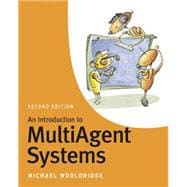
| SETTING THE SCENE. | |
| Introduction. | |
| The Vision Thing | |
| Some Views of theField | |
| Frequently Asked Questions (FAQ) | |
| INTELLIGENT AUTONOMOUS AGENTS. | |
| Intelligent Agents | |
| Intelligent Agents | |
| Agents and Objects | |
| Agents and Expert Systems | |
| Agents as Intentional Systems | |
| Abstract Architectures for Intelligent Agents | |
| HowtoTell an Agent What to Do | |
| Deductive Reasoning Agents. | |
| Agents as Theorem Provers | |
| Agent-Oriented Programming | |
| ConcurrentMetateM | |
| Practical Reasoning Agents. | |
| Practical Reasoning=Deliberation+Means-Ends Reasoning | |
| Means-EndsReasoning | |
| Implementing a Practical Reasoning Agent | |
| The Procedural Reasoning System | |
| Reactive and Hybrid Agents. | |
| Reactive Agents | |
| Hybrid Agents | |
| COMMUNICATION AND COOPERATION. | |
| Understanding Each Other. | |
| Ontology Fundamentals | |
| Ontology Languages | |
| RDF | |
| Constructing an Ontology | |
| Software Tools for Ontologies | |
| Communicating. | |
| Speech Acts | |
| Agent Communication Languages | |
| Working Together. | |
| Cooperative Distributed Problem Solving | |
| Task Sharing and Result Sharing | |
| Result Sharing | |
| Combining Task and Result Sharing | |
| Handling Inconsistency | |
| Coordination | |
| Multiagent Planning and Synchronization | |
| Methodologies. | |
| When is an Agent-Based Solution Appropriate? | |
| Agent-Oriented Analysis and Design | |
| Pitfalls of Agent Development | |
| Mobile Agents | |
| Applications. | |
| Agents for Work flow and Business Process Management | |
| Agents for Distributed Sensing | |
| Agents for Information Retrieval and Management | |
| Agents for Electronic Commerce | |
| Agents for Human-Computer Interfaces | |
| Agents for Virtual Environments | |
| Agents for Social Simulation | |
| Agents for X | |
| Multiagent Decision Making. | |
| Multiagent Interactions. | |
| Utilities and Preferences | |
| Setting the Scene | |
| Solution Concepts and Solution Properties | |
| Competitive and Zero-Sum Interactions | |
| The PrisonerÆs Dilemma | |
| Other Symmetric 2 x 2 Interactions | |
| Representing Multiagent Scenarios | |
| Dependence Relations in Multiagent Systems | |
| Making Group Decisions. | |
| Social Welfare Functions and Social Choice Functions | |
| Voting Procedures | |
| Desirable Properties for Voting Procedures | |
| Strategic Manipulation | |
| Forming Coalitions. | |
| Cooperative Games | |
| Computational and Representational Issues | |
| Modular Representations | |
| Representations for Simple Games | |
| Coalitional Games with Goals | |
| Coalition Structure Formation | |
| Allocating Scarce Resources. | |
| Classifying Auctions | |
| Auctions for Single Items | |
| Combinatorial Auctions | |
| Auctions in Practice | |
| Bargaining. | |
| Negotiation Parameters | |
| Bargaining for Resource Division | |
| Bargaining for Task Allocation | |
| Bargaining for Resource Allocation | |
| Arguing. | |
| Types of Argument | |
| Abstract Argumentation | |
| Deductive Argumentation Systems | |
| Dialogue Systems | |
| Implemented Argumentation Systems | |
| Logical Foundations. | |
| Logics for Knowledge and Belief | |
| Logics for Mental States | |
| Logics for Cooperation | |
| Putting Logic to Work | |
| V Coda | |
| A History Lesson | |
| Afterword | |
| Table of Contents provided by Publisher. All Rights Reserved. |
The New copy of this book will include any supplemental materials advertised. Please check the title of the book to determine if it should include any access cards, study guides, lab manuals, CDs, etc.
The Used, Rental and eBook copies of this book are not guaranteed to include any supplemental materials. Typically, only the book itself is included. This is true even if the title states it includes any access cards, study guides, lab manuals, CDs, etc.